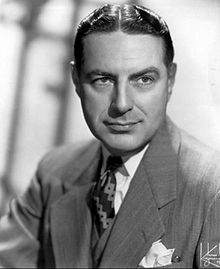Ted Mack (radio-TV host)
William Edward Maguiness (February 12, 1904 – July 12, 1976), known as Ted Mack, was the host of Ted Mack and the Original Amateur Hour on radio and television.
The son of a railroad brakeman, Mack was born in Greeley, Colorado. His mother was a teacher and a pianist. Mack graduated from Sacred Heart High School in Denver, Colorado, in 1922 He was class president there for three years in addition to playing football and basketball and playing in the school's orchestra. He went on to Denver university, where he majored in law and commerce.
Mack's career in show business began in 1926 when he joined Ben Pollack's orchestra.
In the late 1920s, clarinetist and saxophonist Mack formed a dance band, under his real name. A nightclub owner didn't like how "Edward Maguiness" looked on his marquee, so he changed the bandleader's name to the shorter and snappier "Ted Mack." The name stuck.
At one point, Mack was known as "the performer with the longest run of any master of ceremonies at the Paramount theater, New York," having been in that role for five months.
Mack and his orchestra spent the summer of 1933 entertaining at the Chicago World's Fair, after which they had an engagement for two months in New York City. A 1934 newspaper review said, "Ted Mack and his bandmen furnish comedy fare and entertaining music in equal measure, and the group of personable young women who assist display talent as well as good looks."
Mack was musical supervisor for Metro-Goldwyn-Mayer, where he was orchestra director for The Great Ziegfeld and Beat the Band.
The Original Amateur Hour began on radio in 1934 as Major Bowes' Amateur Hour, and ran until the 1946 death of its creator, Major Bowes. Mack, a talent scout who had directed the show under Bowes, revived it in 1948 for ABC Radio and the DuMont Television Network.
The show lasted on radio until 1952 and until 1970 on television, where it ran on all four major networks, ending as a Sunday afternoon CBS staple. A success in the early days of television, the program set the stage for numerous programs seeking talented stars, from The Gong Show to Star Search to American Idol to America's Got Talent.
...
Wikipedia

